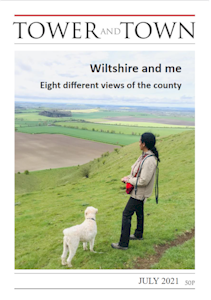

Tower and Town, July 2021 (view the full edition) (view the full edition)A Good ReadI've been immersed in other worlds this month, which is after all, one of the points of reading. I'm never going to learn Japanese (too old, too lazy), nor am I going to go to sea on a trawler (too old, too seasick!) but other people have done just those things so I can read about them. Polly Barton's Fifty Sounds is a series of essays recording her total immersion in Japanese language and culture. Taking in turn 50 sounds or phrases Barton considers the psychological re-wiring that occurs as language evolves from something one learns to something one is. In possession of one language, the acquisition of another starts as an attempt to bend the new tongue into something relatable, to say the same things, and be the same person, just using different words. The author shows us that instead language-learning is transformative, and uncomfortable. One's use of language becomes indicative of the adaptations one makes to fit in to a new culture, and to an extent the development of a new personality, an ability to shed one skin and slide into another - which ability is both admirable and perhaps faintly dubious. Isn't a chameleon-like 'fitting in' also a sign that one's nature is unfixed and untrustworthy? Philosophical, candid and entertaining I will return to this book, not least because I'm not entirely sure I've understood everything she says. In fact I think I may be experiencing uka-uka - 'the sound of always being slightly wrong'. Dark, Salt, Clear by Lamorna Ash is also, obliquely, about identity and the limits of language. Part memoir, part sociological study the author describes her brief period working with the men of a fishing trawler out of Newlyn in Cornwall. The lived reality of the fishing industry is, obviously, far from romantic, but within the insular yet welcoming community she encounters a depth, nuance and pride. The fishermen, tough, competent, all blokey banter, pranks and epic drunken nights in the local pubs are also thoughtful, self-aware and tolerant. Referencing Melville, Woolf and Sebald, Ash acknowledges the difficulty of finding language that adequately evokes the liminal existence of those who make a precarious living in harsh conditions . By her own admission, the author is posh, educated and seeking an identity that her subjects take for granted. In this thoughtful, observant book she demonstrates that belonging cannot be forced, but attachment and acceptance come gradually. Debby Guest |